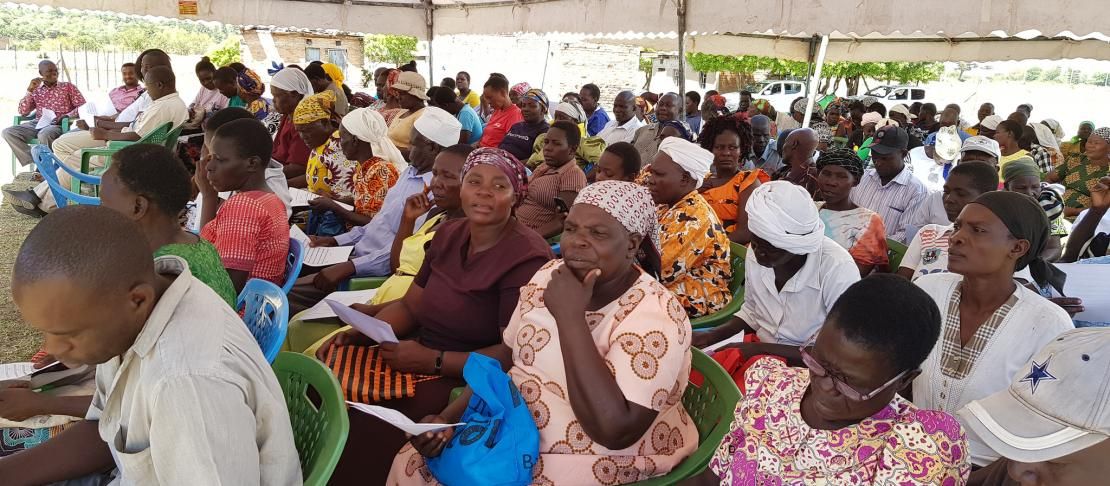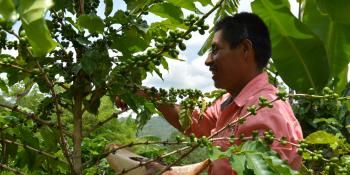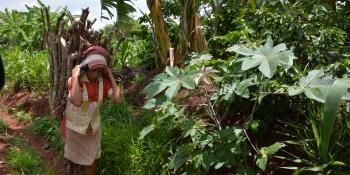Crowd sourcing and participatory varietal selection trials launched in Kenya

Farmers in Kenya test crop varieties to better manage climate risks.
Climate change is leading to the shifting and shortening of seasons, erratic rainfalls, prolonged droughts and higher mean temperatures in the Nyando basin in Kenya. As a result, the varieties that farmers use do not perform well under the changing climatic conditions. Therefore, there is a need to mobilize locally viable options for adaptation through efficient methods, such as participatory research.
A project led by Bioversity International on "open source" seed systems for beans, sorghum, and finger millet for climate change adaptation in East Africa aims to address these challenges. Some of the main strategies include increasing farmers’ access to a wider range of agricultural biodiversity, in order to arm them with options to better manage climate risks and biotic stresses, such as pests and diseases.
An accession is a group of related plant material from a single species collected at one time from a specific location. Each accession has a unique identifier based on GIS location and time of collection. These unique identifiers are used to maintain associated information in genebanks.
The first phase of the project consisted of finding suitable and diverse germplasm for the climate profiles of Nyando Basin. Using various computational models based on Geographic Information Systems (GIS) and Climate profiles, Bioversity International identified about 265 accessions of millet from the national genebanks of Uganda and Kenya; 261 accessions of sorghum from the genebanks of Kenya, Uganda and Tanzania; and 20 accessions of beans from the genebank of Uganda for selection by farmers. After three seasons of multiplication, many varieties did not survive the relatively shorter seasons and climate in Kenya.
Participatory varietal testing and evaluation using crowd sourcing techniques
Between 28 and 30 January 2019, 10 field staff were trained on data collection using the Triadic Comparison of Technologies (TRICOT) methodology. This is an approach to test crop varieties and other technologies on-farm under realistic conditions. Through experimentation the participating farmers identify innovations that will be of real benefit to them. TRICOT is a ready-made methodology serving both research and the dissemination of varieties and other technologies and practices in diverse areas.
Through geographically distributed testing, TRICOT is able to provide information about geographic patterns in climate adaptation and help speed up the identification of locally suitable varieties or technologies to respond to climate change. It provides a means to link the technological development of research institutes to real-life experiences of farmers. It is supported by a digital platform that is known as ClimMob App. The app allows many farmers to test multiple varieties or accessions for different variables. Farmers can select specific traits to test for such as drought tolerance, heat stress, early maturity, and pests and disease resistance.
See the photos on Flickr:
A total of 440 farmers from 16 villages accross Nyando were trained on the TRICOT methodology for testing varieties. Each farmer was offered a package of three different varieties of sorghum, millet and beans. The varieties were drawn from a pool of several varieties, so for instance while one farmer received sorghum varieties A, B and C, another received A, B and D, and a third B, C and D and so on for the other crops as well. The farmer has to note which of the three is best and which is worst according to a list of characteristics developed together with the researchers. Throughout the season the farmers will give feedback on the three varieties they have received indicating which ones they like most. This information will be used to identify the best performing varieties of each crop for the farmers.
Information from crowd sourcing will be backed up by mother trials being conducted at the community farm in the same locations. These varieties will be planted in each site and replicated three times on completely randomized block design plots. Data that will be collected will include phenological and agronomic traits. The mother trials will also help researchers select best performing varieties with farmers using participatory variety selection. This integrates farmer assessment with observations of researchers in order to select elite lines.
Read more:
- Project page: Open Source Seeds Systems in East Africa | Hivos
- Blog: Open source seed systems for climate change adaptation in Kenya, Uganda and Tanzania: highlighting the importance of policy support
Gloria Otieno is an Associate Scientist at Bioversity International.



